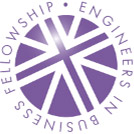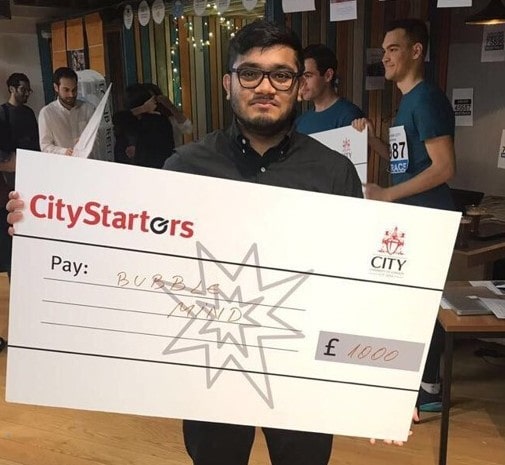Computer Sciences Student Makes a Spark with an ‘Autism App’
Computer Sciences student Yamin Miah (Mohamed) has won a £1,000 cash prize as a finalist in City, University of London’s MakerSpark business ideas competition for creating an ingenious app, BubbleMind, for autistic children to use at home or at school.
BubbleMind helps autistic children to feel calm if they become stressed during their day to day life. The personal version of the app works by pressing a button on a digital device which then plays a calming musical note and colourful bubbles appear on the screen.
The educational version of BubbleMind is based on the same concept but also features learning elements. Instead of only playing a musical note when the button is pressed, it speaks a number or a letter of the alphabet. For example, if the user presses the button numbered 5, BubbleMind will say five out loud and produce the colourful bubbles onscreen.
Yamin was privileged to be able to trial BubbleMind with a pupil with severe autism at Starks Field School in Edmonton, London. The pupil used the app on Yamin’s laptop with positive feedback from the student and the teacher.
Yamin was one of 45 students who took part in City, University of London’s engineering student-focused MakerSpark Competition, a new component in its hugely successful City Spark business ideas and venture creation competition which attracts a huge number of entries from students across the university who vie for a share of the £25,000 prize money! City Spark and MakerSpark competitions inspire students and recent alumni to develop innovative ideas, test them with potential customers and go on to develop their ideas if they so wish.
MakerSpark is sponsored by the charity Engineers in Business Fellowship (EIBF) which also awards the Sainsbury Management Fellows MBA scholarship to talented young engineers. The EIBF competition fund was piloted three years ago and expanded greatly this year to allow universities all over the UK to bid for £3,000 towards cash prizes for the most enterprising ideas in their business innovation competitions or electives. The aim is to increase participation of engineers in business competitions – this enhances their learning, knowledge and employability. While not a requirement for funding, some of these innovative concepts may go on to become real businesses.
Universities use the Engineers in Business prize fund to inspire more engineering students and graduates to become involved in their competitions. Yamin said: “I learned so much from taking part, especially around planning, pitching and sales. I learned that planning is essential not only to ensure that each aspect of development was completed before moving onto the next step, but I also needed to ensure that I knew all the steps that need to be taken to complete a certain task. The other element was to think about contingencies in case things didn’t pan out as I expected.
“Participating in MakerSpark helped me to present my ideas to people and gave me the confidence to speak in front of hundreds of people. It has also developed my presentation skills and I’m sure this will help me pitch ideas to people in my future career.
“The other big lesson was how to sell to customers and convince them to purchase my product. A key thing that I learned is to create a great backstory to let people know why I invented the product. This shows that I’m passionate about my invention.”
An integral part of MakerSpark is the support participants received from university staff and entrepreneurs who provide guidance and mentoring. Yamin said: “Support from the organisers was excellent. Not only was I entering individually rather than as part of a team; I was the youngest competitor so I was nervous and lacking in confidence. Marius Stancu, the Enterprise Education Projects Officer, helped me plan for my pitch; he told me what I should include and how I should present my ideas. Alex Elkins, Head of Entrepreneurship, helped me remain calm and made sure that my pitch was ready and perfect. They were always willing to meet to discuss ideas and issues.”
Yamin will use his £1,000 prize for further development. The judges advised him to focus on one thing at a time; to set achievable expectations, and to gather scientific evidence, not just anecdotal evidence, that shows that BubbleMind works effectively because this will help him to sell the app.
Yamin concluded: “Taking part in MakerSpark has given me the confidence to launch my business, the fact that I was able to test my ideas and see that people loved my ideas has motivated me to launch the BubbleMind business. Also, I can add this valuable experience to my list of achievements on my CV which will help me stand out when applying for jobs.”
Published with the permission of the winner, Computer Sciences student Yamin Miah (Mohamed)

